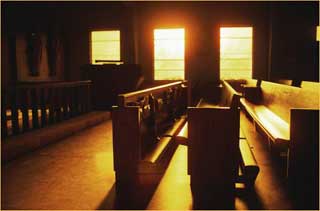 Dr. Bruce Winston, the Dean of our school (School of Global Leadership and Entrepreneurship) here at Regent University, proposes that the first beatitude in Matthew's Sermon on the Mount (5:3); "blessed are the poor in spirit, for theirs is the kingdom of heaven", is the foundational and primary value for Christian Leadership. Judith Hougan proposes that poverty is central to our experience as humans: "...poverty is part of our story, our reality, part of who we are in this fallen world. This poverty is not specifically our sin nature, but in our weakness, we certainly fall prey to sin." Hougan continues on and describes how the "myth of competence" hinders our acceptance of our "poverty of spirit" and thus keeps us from accepting and receiving the kingdom of heaven: "The myth of competence is founded in a competitive framework for living, the idea that life is about 'bigger and better'."
Dr. Bruce Winston, the Dean of our school (School of Global Leadership and Entrepreneurship) here at Regent University, proposes that the first beatitude in Matthew's Sermon on the Mount (5:3); "blessed are the poor in spirit, for theirs is the kingdom of heaven", is the foundational and primary value for Christian Leadership. Judith Hougan proposes that poverty is central to our experience as humans: "...poverty is part of our story, our reality, part of who we are in this fallen world. This poverty is not specifically our sin nature, but in our weakness, we certainly fall prey to sin." Hougan continues on and describes how the "myth of competence" hinders our acceptance of our "poverty of spirit" and thus keeps us from accepting and receiving the kingdom of heaven: "The myth of competence is founded in a competitive framework for living, the idea that life is about 'bigger and better'."When leaders accept our own poverty of spirit, we are free to be honest and true - free to speak about our brokenness, sin and wrong motives within the larger community and thus we are ushered into the arena of the possibility of growth and Gospel transformation that the kingdom of heaven offers. Dietrich Bonhoeffer comments: "He who is alone in his sin is utterly alone....The final breakthrough to fellowship does not occur, because, though they have fellowship with one another as believers and as devout people, they do not have fellowship as the undevout, as sinners. The pious fellowship permits no one to be a sinner. So everyone must conceal his sin from himself and from the fellowship. We dare not be sinners."
Christian leaders take the first step in leading, by accepting their own personal brokenness and poverty and so come to the end of themselves - ready to accept that Christ shall be all and that He is the only hope for moral and transformative leadership.
References:
Bonhoeffer, D. 1954. Life Together. New York: HarperSanFrancisco, page 110.
Hougen, J. 2005. The Community of the Broken. Conversations, Volume 3:2, 55-60.
